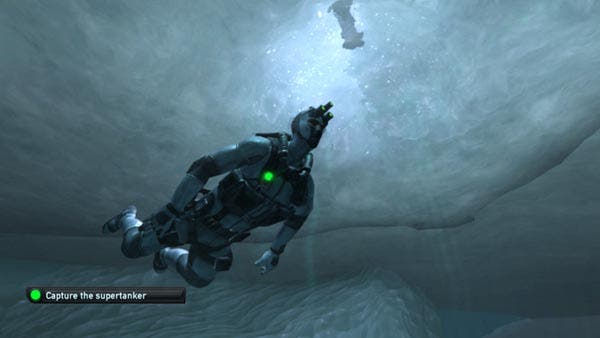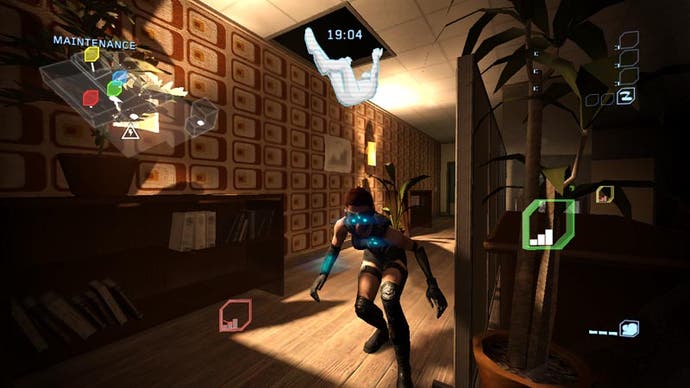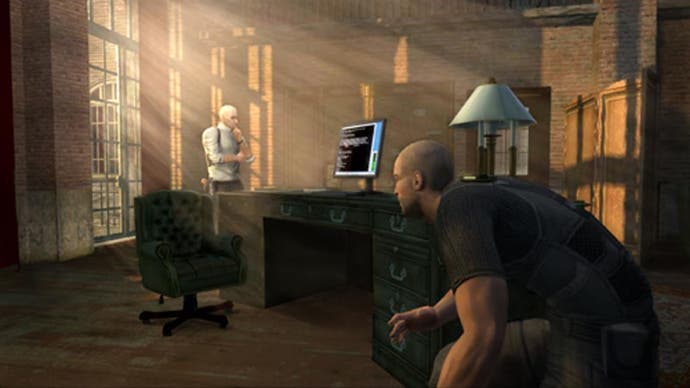Tom Clancy's Splinter Cell: Double Agent
Whose side is he on?
Not every game looks amazingly realistic. Not every game has fancy menus. Not every game has the official licence, name or tits. Not every game has Mark Hamill doing voice acting. Alright, every game does have Mark Hamill doing voice acting, but not every game has Mark Hamill doing voice acting on a Tuesday. What we can rely on though - what holds the world to order - is the understanding that if someone shoots Mark Hamill, or indeed anyone, to death, they will fall down on cue.
So it'd be pretty rubbish if you heard gunshots after somebody had fallen over, and indeed it is pretty rubbish when this happens in Splinter Cell: Double Agent on the PlayStation 3. It happens on level one, when your little agency cohort gets a bit ahead of himself and finds himself captured by Islamic extremists. It's a pitiful sight (and, eventually, sound), and it's symptomatic of a port that's at best loveless and sometimes rather hateful - something made all the more annoying given how brilliant Double Agent was on the Xbox 360.
Splinter Cell has always built tension effectively, but Double Agent took things further, putting you in the hands of opposing masters; your ultimate goal was to infiltrate and undermine a terrorist organisation, but to do that you'd have to appease them while you kept your NSA bosses happy, by snipping wires and drawing on terrorist faces while they slept. All sorts of things affected the trust your superiors had for you, and some decisions were genuinely troubling: told to kill a helicopter pilot, would you pull the trigger in his face, knowing that he's dead anyway, or risk pissing off your terrorist boss by refusing? With multiple objectives competing for your time and competing with one another, staying undercover was just as important as finding cover had ever been.

Double Agent on PS3 is ostensibly the same game - with the same training levels, the same single-player campaign, the same nonsense story you probably won't care about, and a couple of new multiplayer levels that will be released on Xbox 360 before long anyway - but in making the transition to Sony's new console, something's gone wrong. Things are rubbish even before you start, as once-smooth load-screen cinematics shudder and crackle distractingly. In-game, your first task is to infiltrate a geothermal plant in Iceland: on Xbox 360, there's barely a frame missing; on PS3, the frame rate's dipping below the surface of acceptability before you've even climbed out of the water. Were this because the game was trying for 1080p it might be understandable, but Double Agent runs in the same 720p resolution on both consoles. Glitches, like the aforementioned gunshot mentalism, do little to convince you of the game's composure.
Fortunately, it's a problem that seems to lessen once the game gets going, and the rest of the package is much the same as it is on Xbox 360. The campaign mode is an agreeable selection of levels that involve all the requisite sneaking around, and trying to avoid discovery by keeping an eye on guards, grabbing them by the neck and dropping silently onto their heads when the need takes you, and everything you need is at your disposal.

The controls are much as they were, allowing you to manoeuvre Sam Fisher around with the left stick and rotate the camera with the right, while shoulder and face buttons swap between inventory items and perform stealthy take-downs. The main change is that you're given the option to pick locks using the Sixaxis' tilt sensor. Instead of rotating the analogue stick until you feel a buzz, you now tilt the controller left and right until the tumblers in the lock start to jiggle visibly. If you're not taken with this, you can switch it off and simply rotate and watch for movement, but there's nothing massively wrong with the new system, even if it is a bit throwaway.
Turning in the direction of the Internet (hello), Double Agent distinguishes itself with a pair of new multiplayer maps and a new skin - the female spy. The latter is what it is (a character model with ladybumps), while the former are more likely to appeal to people who've already played the initial missions extensively, and so may be welcome, but will no doubt attract more interest when they arrive on Xbox Live along with the girlie spy. Otherwise, the multiplayer side of the game is set up in much the same way. The menus are laid out slightly differently, but you can still set up squads, look at global leaderboards for challenges and versus levels, and view your friends list. And that means you get the same excellent, balanced game of cat-and-mouse, as mercenaries try and stop the nimble spies reaching and hacking their data, with the same system of bonuses, unlockables and upgrades to add further incentive to return, which you will, time and again. There are six more expert co-op challenges here, too.

Overall, if you've got the option to choose between the two, the Xbox 360 version is definitely preferable. What more the PS3 has will be added via downloads, and in technical terms there's no debate. Taken alone though, Double Agent on the PS3 is still a fine game, and its clunkiness is excusable when taken in the context of its achievements, dragging fans out of their comfort zone in commendable fashion, and arguably providing enough content between its separate single- and multiplayer components that each could stand alone. It's not the easiest game for newcomers to approach (the tutorial's dreadful), but even stealth virgins will see the light after an hour or so in the dark, and probably ought to add another mark to the score. Make ours a double.


